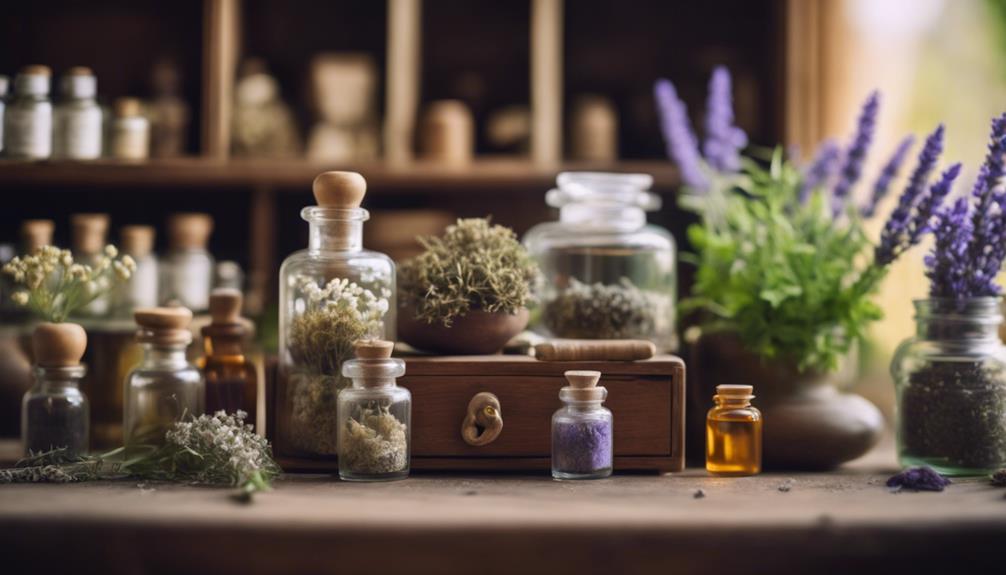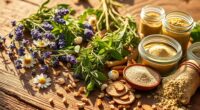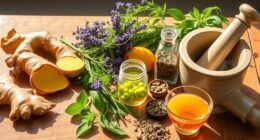As we strive for a successful practice in herbalism, we recognize that it's essential to build a strong foundation in botany and holistic health, identify our unique niche, develop our skills through hands-on experiences, surround ourselves with a supportive network, and advocate for the integration of herbal remedies into mainstream healthcare. By following these five steps, we can establish a thriving practice that provides quality care to our clients. From developing a thorough knowledge base to collaborating with healthcare professionals, each step is vital to making a meaningful impact in the world of herbalism. As we continue on this journey, we'll uncover the nuances of each step and reveal the full potential of herbal medicine.
Key Takeaways
• Pursue formal education and gain practical experience to build a strong foundation in herbalism.
• Identify a specific niche, such as women's health or mental wellness, to stand out in the field.
• Develop hands-on skills through continuous learning, refinement, and guidance from experienced herbalists.
• Build a supportive network by connecting with like-minded individuals, attending events, and participating in mentorship programs.
• Advocate for herbal medicine by raising awareness, lobbying for policies, and collaborating with healthcare professionals to integrate herbal therapies into mainstream healthcare.
Building a Strong Foundation
As we lay the groundwork for our herbalism journey, we need to establish a solid foundation that will support our growth and development as herbalists. This foundation is essential in building a successful practice in herbal medicine.
We believe that pursuing formal education through reputable programs or schools is an important step in gaining a solid understanding of herbalism. This education provides us with a thorough knowledge base in botany, plant identification, herbal preparations, and holistic health principles.
However, we also know that hands-on experience is crucial in complementing our theoretical knowledge. We need to gain practical experience by working with experienced herbalists or participating in internships and apprenticeships. This hands-on experience will help us develop the skills and confidence we need to practice herbalism effectively.
Finding Your Herbal Niche

We're now refining our herbalism practice by identifying a specific area of expertise, allowing us to stand out in the field and attract clients seeking specialized care.
Finding your herbal niche is an important step in making herbalism make sense for you and your clients. When we specialize in a particular area, we can explore deeper into the world of herbs and their capabilities, building credibility and connecting with a targeted audience. This could be women's health, mental wellness, or digestive issues – the possibilities are endless.
By choosing a niche, we can focus our learning, research, and practice on a specific area of herbal medicine. This integration helps us stand out in the field, attracting clients seeking specialized care and contributing to our professional growth and success.
It's crucial to choose a niche that resonates with us, whether it's based on personal health experiences, community needs, or a passion for a specific health condition. By doing so, we can create a unique space for ourselves in the world of herbalism and make a meaningful impact on our clients' lives.
Developing Your Herbal Skills

By immersing ourselves in hands-on experiences, such as growing, harvesting, and preparing herbs for medicinal use, we can begin to develop the skills necessary to excel in our chosen herbal niche.
As we explore further into the world of herbalism, we realize that theoretical knowledge is only half the battle. To truly master our craft, we need to put our herbal skills into practical application. This means continuously learning and refining our techniques, whether it's through reading herbal medicine books, taking online courses, or attending workshops.
We can also seek guidance from experienced herbalists who can offer valuable insights and practical tips. By combining theoretical knowledge with practical experience, we can develop a deep understanding of herb identification, properties, and applications.
As we refine our herbal skills, we'll become more confident in our ability to create effective remedies and provide quality care to our clients. With persistence and dedication, we'll be well on our way to becoming skilled herbal practitioners.
Building a Support Network

We establish a strong foundation for our herbalism practice by surrounding ourselves with a supportive community of like-minded individuals who share our passion for herbal medicine. Having a network of peers, mentors, and collaborators can provide valuable guidance, resources, and encouragement as we navigate the world of herbalism.
To build our support network, we can:
- Join local herbalist groups or online communities to connect with others who share our interests
- Attend herbal conferences, workshops, and events to learn from experienced practitioners and make connections
- Engage in mentorship programs with established herbalists to gain guidance and insight
- Collaborate with other healthcare professionals, such as naturopaths or nutritionists, to create a holistic support network
- Cultivate relationships with herb suppliers, farmers, and producers to guarantee access to high-quality herbs for our practice
Advocating for Herbal Medicine

How can we effectively promote the value of herbal remedies in health and wellness practices, guaranteeing their integration into mainstream healthcare systems? As proponents of herbal medicine, we endeavor to raise awareness about the efficacy and safety of herbal treatments through education and outreach. Our aim is to integrate herbal remedies into mainstream healthcare systems, providing thorough patient care. To achieve this, we collaborate with healthcare professionals and policymakers to enhance the recognition and utilization of herbal therapies in clinical settings.
| Strategies | Goals |
|---|---|
| Education and Outreach | Raise awareness about herbal remedies' efficacy and safety |
| Lobbying for Policies | Ensure accessibility and integration into mainstream healthcare |
| Collaboration with Healthcare Professionals | Enhance recognition and utilization of herbal therapies |
Frequently Asked Questions
How to Become a Successful Herbalist?
We want to become successful herbalists, but where do we start?
To gain expertise, we need to engage in formal education programs, seek guidance from experienced mentors, and develop a niche to stand out.
Continuous learning through workshops and certifications is essential.
What Is the Best Way to Learn Herbalism?
We're often asked: what's the best way to learn herbalism?
Surprisingly, a mere 12% of herbalists are formally trained. To fill this knowledge gap, we believe a combination of formal education and self-study is key.
Enrolling in reputable courses, seeking mentorship, and staying updated through workshops and online resources are all essential steps in mastering herbalism.
How Long Does It Take to Become a Herbalist?
We're often asked how long it takes to become a herbalist. The answer varies, but typically, it takes 2-4 years of education and training to become a professional herbalist.
This timeframe can fluctuate depending on our individual dedication, study pace, and chosen specialization. Certification can be obtained after completing required training, and ongoing learning is essential to hone our skills and stay updated in the field.
When Can I Call Myself an Herbalist?
When can we call ourselves herbalists?
We can use this title once we've completed formal education or training in herbal medicine. Additionally, obtaining certification from recognized organizations, such as the National Institute of Medical Herbalism, qualifies us to use the title.
It's essential to have practical experience and a deep understanding of herbal remedies before identifying as an herbalist.
Conclusion
As we conclude our journey through the world of herbalism, we're reminded that embracing this ancient practice requires dedication, persistence, and a willingness to learn.
By laying a strong foundation, finding our niche, developing our skills, building a support network, and advocating for herbal medicine, we can harness the power of plants to transform our lives and the lives of those around us.
As we look to the future, we're met with the promise of a brighter, healthier tomorrow, where herbalism takes its rightful place in the domain of modern medicine.










